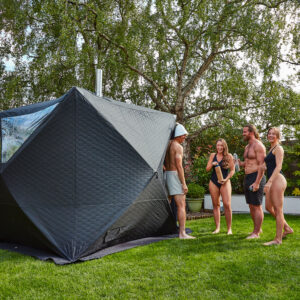
Ice Baths: A Key to Enhanced Recovery and Vitality for Athletes
Explore how ice baths can boost recovery and enhance vitality for athletes. Discover practical tips and insights to elevate your performance. Read more!
Christmas Delivery: UK orders by 10am, 19th Dec. Ireland/EU by 12pm, 15th Dec. Dispatch resumes 2nd Jan.
Spend Over £500 To Get Free UK Delivery - Excludes Certain Postcodes & Round Ice Baths
Delivery to Ireland now available

Curious about cold water swim benefits? This swim style may offer more than just a brisk wake-up call. It has been linked with improved circulation, increased metabolism, stronger immune defence, and clearer mental health. This article dives into the cold, revealing the benefits validated by science, preparing you for what to expect and why it might be worth incorporating into your wellness routine.
Cold water swimming enhances cardiovascular health and metabolism by challenging the body to adapt to temperature changes, potentially lowering blood pressure and activating brown adipose tissue for increased calorie burn.
Regular cold water immersion can lead to improved mood and mental clarity due to the release of endorphins and dopamine, offering a natural high and aiding in the reduction of anxiety and depression.
While cold water swimming can boost the immune system and may offer therapeutic benefits for chronic conditions, it’s crucial to prioritise safety through proper acclimatisation, awareness of personal limits, and avoidance of alcohol.

Think of your body as a complex machine, intricately designed and finely tuned. Now, imagine the shock and thrill it experiences when plunged into cold water. This sudden change in temperature serves as a physiological challenge, pushing the body to adapt and respond in remarkable ways. As cold water swimmers brave the icy depths, their bodies spring into action, implementing a series of responses to maintain body temperature through mechanisms like vasoconstriction and vasodilation.
Swimming, in itself, is a wholesome activity, conferring benefits like enhanced flexibility, improved heart and lung function, and reduced injuries. Add to this the stimulating effect of cold water, and you have a recipe for increased cardiovascular health and efficient metabolism. But that’s not all. The art of cold water swimming is a delicate dance between challenge and adaptation, sprinkled with a dash of caution. Let’s dive deeper into these fascinating physiological responses and their impact on physical health.
Swimming in cold water is like a workout for your heart. The heart pumps harder in response to the physical activity and lower water temperatures, strengthening the cardiovascular system. Engaging in regular cold water swimming can lead to lower blood pressure and potentially reduce the risk of heart disease in the long run.
Regular cold water swimmers often showcase improved blood pressure and lipid profiles, marking a significant boost in cardiovascular health. However, caution is advised for individuals with preexisting heart conditions, as cold water exposure might pose certain risks. As in any exercise regimen, knowing your limits, listening to your body, and seeking professional guidance are key.
When you plunge into cold water, your body springs into action, activating brown adipose tissue (BAT) to generate heat and counter the effects of the cold. This process, known as non-shivering thermogenesis, not only helps you stay warm but also sparks a metabolic awakening, enhancing calorie burn.
This activation of BAT can support weight management and protect against metabolic diseases. However, to achieve optimal metabolic awakening, a gradual and progressive acclimatization program to cold water swimming is recommended, under proper supervision. So, with every icy plunge, you’re not just braving the cold but also firing up your metabolism!

Cold water swimming, also known as ice swimming, isn’t just a test of physical endurance; it’s also a journey into mental clarity. The icy embrace of the cold water diverts your focus to the present moment, the sensation of the cold, and the rhythm of your breath. This mindfulness, akin to a form of dynamic meditation, can significantly boost mood, lower stress, and contribute to a calming effect.
The psychological perks of cold water swimming can be further amplified when shared with a group. The camaraderie, shared experiences, and collective euphoria can dramatically enhance mental well-being. Let’s explore these psychological benefits in more detail.
Cold water swimming can spark a natural high. As your body dives into the freezing depths, it responds by releasing a surge of endorphins, known as ‘feel-good’ hormones, and dopamine, which enhances mood. These chemical reactions in your body lead to a sense of contentment and relaxation, culminating in a post-swim euphoria that many swimmers rave about.
This natural high not only elevates your mood but also serves as a natural stress reliever, helping to balance the physical challenges of cold water swimming with a profound sense of peace and joy. The release of stress hormones during this activity contributes to the unique combination of physical exertion and mental relaxation that paints the holistic picture of the cold water swimming experience.

Cold water swimming can be a soothing balm for the mind. The intense focus on the ‘here and now’, the keen awareness of your surroundings, and the primal need to stay warm all contribute to a state of mindfulness. This focus on the present can provide a much-needed respite from the pressures of daily life, particularly for those with high-pressure jobs.
The calming waves of cold water swimming also have the potential to reduce anxiety and depression. The challenging activity, coupled with the euphoric sensation post-swim, can lead to significant improvements in mental health. So, with every cold water swim, you’re not just navigating chilly waters but also charting a course towards mental clarity and tranquillity.
The icy waters hold a potential secret to boosting your immune system. The short stress of cold water immersion might prime the immune system, potentially leading to an enhanced immune response. Regular cold water swimmers often report fewer respiratory infections compared to their non-swimming peers, hinting at the immune-boosting effects of this practice.
Winter swimmers, in particular, appear to enjoy increased resistance to illnesses. They tend to experience illnesses less frequently and more mildly, suggesting that regular exposure to cold water might strengthen the immune system. However, it’s essential to note that this immune boost might vary among individuals, and further research is needed to establish a direct cause-effect relationship.
Beyond the thrill and challenge of cold water swimming lies a potential therapeutic avenue for chronic conditions. Cold therapy, which involves the application of cold to the body, can alleviate arthritis pain, particularly during flare-ups when joints become hot and swollen. Immersion in cold water, such as ice baths, can reduce blood flow to areas of inflammation, stimulating an anti-inflammatory response.
This could potentially transform a cold water swim from a simple recreational activity into a therapeutic regimen, providing relief for those battling chronic conditions. However, it’s crucial to approach this practice with caution and under the guidance of a healthcare professional, especially for individuals with specific health conditions.

Cold water swimming isn’t just an individual pursuit; it’s a community affair. The cold water swimming community is known for its welcoming environment, making it easier for newcomers to join and participate. Regular meetups foster a sense of camaraderie and offer the opportunity to make new friends, significantly boosting social wellbeing.
These meetups can contribute greatly to participants’ lives, providing a sense of belonging, routine, and shared experiences, often at no cost. The growing popularity of this practice, as reflected by the substantial growth of the community, signifies the social currents that drive the cold water swimming movement.
Safety is paramount when it comes to cold water swimming. Preparing for the plunge involves a gradual approach, allowing your body to adjust to the cold temperature. Here are some steps to follow:
Start with warmer conditions and gradually decrease the water temperature.
Incorporate regular cold showers or baths to acclimate your body to the cold.
Progressively swim in cooler temperatures to further adapt to the cold.
By following these steps, you can safely enjoy the benefits of cold water swimming.
To ensure a safe swim in cold water, follow these steps:
Monitor your swim time and be aware of your personal limits.
Exit the water before becoming too cold.
Immediately dry off and dress in warm clothing to stabilize your body temperature and avoid hypothermia.
Consider enrolling in a cold water swimming course to learn essential safety skills.
Always swim in areas with qualified lifeguards and swimming pools to ensure maximum safety.
Beyond the health benefits and the exhilarating cold, there’s a deeper allure to cold water swimming. Wild swimming, particularly in open water bodies, offers a sense of liberation and adventure that’s hard to capture in indoor pools. This practice allows swimmers to experience landscapes from a fresh perspective, offering opportunities to:
Observe natural rarities
Connect with nature
Feel a sense of freedom and adventure
Challenge oneself physically and mentally
The mental health benefits of wild swimming are significant, and its impact on mental and physical health is noteworthy. It’s recognized for its potential in treating depression and providing a form of mindfulness, beneficially impacting those with depression, anxiety, or PTSD. As we navigate the open waters, we not only test our physical endurance but also connect deeply with nature, embracing the wild and free spirit within us.
With the exhilaration of cold water swimming also comes the need for caution. It’s crucial to balance the benefits with potential risks. Cold water swimming can cause an increase in heart rate and blood pressure, trigger abnormal heart rhythms, and contribute to drowning emergencies due to the cold shock response.
While short-term cold water exposure might enhance immune activity, repeated exposure without adequate recovery can compromise immune function. In extremely cold water conditions, survival time is limited, indicating the necessity for safety and preparedness. It’s also essential to avoid alcohol before swimming to prevent hypothermia and safeguard health.
As we resurface from our deep dive into the world of cold water swimming, let’s reflect on the journey. From the physiological responses of our bodies to the exhilaration of a natural high and the sense of community, cold water swimming encompasses a holistic experience. It’s not just a physical activity but a test of mental strength, a boost to our immune system, a potential therapy for chronic conditions, and a journey into the wild.
Cold water swimming is a dance with nature – a delicate balance of challenge and adaptation, of thrill and tranquillity, of camaraderie and solitude. It’s a journey of self-discovery, resilience, and connection. So, are you ready to dive in?
Cold water swimming can improve cardiovascular health, enhance metabolism, boost mood, reduce stress, and provide potential immune-boosting and therapeutic effects for chronic conditions, such as arthritis. Embracing the cold water could bring multiple benefits to your overall well-being.
When cold water swimming, remember to gradually acclimate, monitor your swim duration, use post-swim warming techniques, and swim in areas with lifeguards. Stay safe and enjoy your cold water swims!
Cold water swimming can positively impact mental health by boosting mood, reducing stress, fostering mindfulness, and enhancing social wellbeing.
Yes, cold water swimming can have potential risks such as increased heart rate and blood pressure, abnormal heart rhythms, and a higher risk of hypothermia. It’s crucial to approach this activity with caution and seek professional guidance.
The allure of wild swimming lies in the sense of liberation, adventure, and connection with nature it offers, as well as the significant mental health benefits such as mindfulness. Dive in and experience the freedom and rejuvenation it brings!

Founder of Urban Ice Tribe

Explore how ice baths can boost recovery and enhance vitality for athletes. Discover practical tips and insights to elevate your performance. Read more!

There’s nothing quite like the raw, elemental power of a pop-up sauna. Portable, authentic, and deeply restorative, it’s the perfect way to reconnect with nature and yourself. But to take your sauna ritual to the next level, the right sauna accessories can make all the difference.

Transform your outdoor space into a personal wellness retreat with the Urban Ice Tribe Sauna Tent. This detailed setup guide walks you through every step, from unboxing to your first steam session, blending practical instruction with the mindful ritual of heat therapy.
Helping men & women release anxieties & limiting beliefs to experience a life of freedom using powerful breathwork, cold water therapy, movement & sound healing.

No spam, notifications only about new products, updates, offers and announcements.